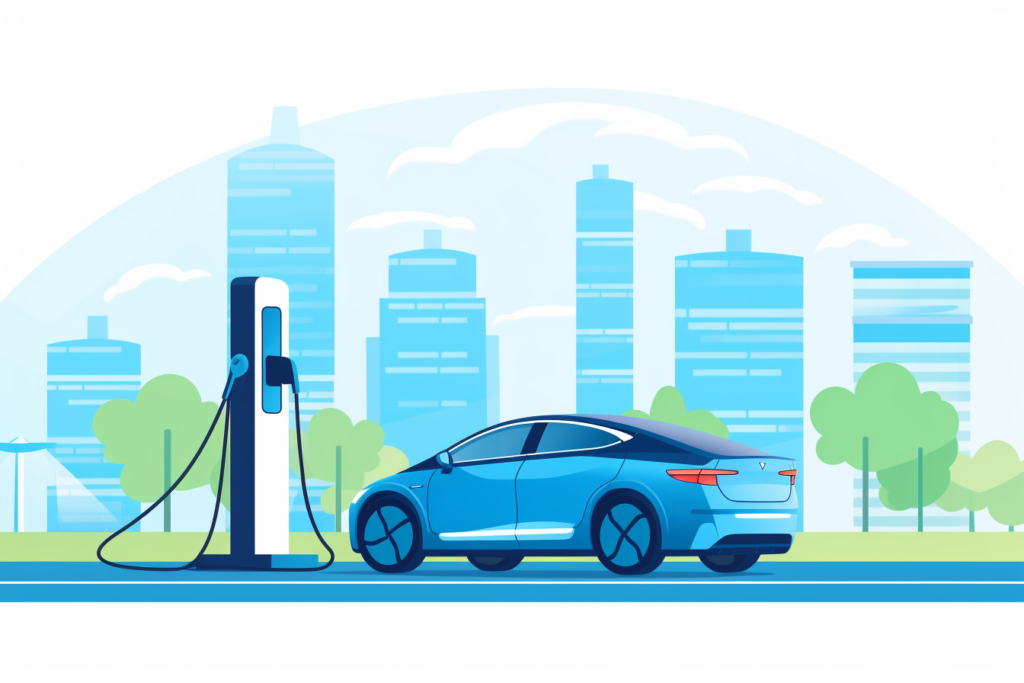As the world transitions towards a more sustainable future, electric vehicles (EVs) are gaining popularity due to their eco-friendly nature and potential long-term cost savings. One of the primary considerations for potential EV owners is the time it takes and the cost involved in charging these vehicles.
In this blog post, we will break down the factors affecting the time and cost of charging an electric car, providing valuable insights to make informed decisions.
Understanding Electric Car Charging
Before we delve into the specifics, it is important to understand the different types of chargers and the terminologies associated with electric car charging:
Charging Levels
- Level 1: Standard 120-volt household outlet.
- Level 2: 240-volt charging stations (common for residential and public charging).
- DC Fast Charging: High-voltage, high-amperage stations available at select locations.
Charging Rate
- Measured in kilowatts (kW), it indicates how quickly your EV can recharge.
- Different EV models have varying charging rates.
How Long Does It Take to Charge an Electric Car?
The time required to charge an electric car depends on several factors:
Battery Capacity: A larger battery capacity will take longer to charge than a smaller one.
Charging Level:
- Level 1 chargers are the slowest, typically adding 2-5 miles of range per hour.
- Level 2 chargers are faster, providing about 10-30 miles of range per hour.
- DC Fast Chargers are the quickest, offering 60-100 miles of range in around 20-30 minutes.
State of Charge (SOC): Charging from a very low SOC to a high SOC will take longer than topping up a partially charged battery.
EV Model: Different EVs have varying charging capabilities, so check your car’s specifications.
How Much Does It Cost to Charge an Electric Car?
The cost of charging an electric vehicle (EV) varies greatly based on several factors, including the following:
Electricity Rates: The cost of electricity varies by location and can be influenced by factors such as local utility rates, time of use (TOU) rates, and whether you charge at home or at a public charging station.
EV Battery Size: Larger battery capacities require more electricity to charge fully. The cost to charge an EV with a larger battery will be higher than that of a smaller battery.
Charging Speed: The charging speed of the station you use can affect costs. Level 1 charging (standard household outlet) is slower and may be cheaper per kWh, while Level 2 and DC fast charging stations can be faster but may have higher per-minute or per-kWh rates.
Charging Location: Charging at home is typically less expensive than using public charging stations. Public charging stations might have different pricing structures, and some even offer free charging.
Charging Network Membership: Some public charging networks require membership or subscription fees, which can impact the overall cost of charging.
Time of Use (TOU) Rates: If you are on a TOU rate plan, the cost of electricity varies based on the time of day. Charging during non-peak hours can be more cost-effective.
Charging Efficiency: The efficiency of your EV’s charging system can vary. Some electricity may be lost as heat during charging, affecting the overall cost.
Distance Traveled: The distance you drive and the charging frequency will impact your monthly charging costs.
To provide a general estimate, let’s consider an example:
Suppose you have an EV with a 60 kWh battery capacity, and your local electricity rate is $0.12 per kWh. Charging the entire battery would cost approximately:
60 kWh (battery capacity) x $0.12 (electricity rate) = $7.20
In this scenario, charging your EV fully at home would cost about $7.20.
Remember that this is a simplified estimate, and actual costs can vary based on the factors mentioned earlier. To get a more accurate idea of charging costs for your specific situation, you can check your electricity rates, review your EV’s energy consumption ratings, and consider any additional fees associated with charging networks or time-of-use rate plans.
FAQs About Charging an Electric Car
Here are a few commonly asked questions about charging an electric vehicle.
How do I charge my EV at home?
You can charge your electric car at home using a standard electrical outlet or installing a Level 2 home charging station. Simply plug your vehicle into the outlet or charging station, and it will start charging.
How long does it take to charge an electric car at home?
Home charging time depends on your car’s battery size and the charging equipment. A full charge can take anywhere from a few hours to overnight.
Where can I find public charging stations?
Public charging stations are found in common areas like parking lots, shopping centers, and along highways. You can use apps or websites to locate nearby charging stations.
How fast can I charge my electric car at a public station?
Charging speed at public stations varies. Level 2 chargers are slower and take a few hours, while DC fast chargers can provide a good charge in as little as 30 minutes.
How much does charging my electric car at a public station cost?
Public charging costs can vary widely. Some stations offer free charging, while others charge per kWh or minute. Pricing is often displayed at the charging station or in charging apps.
Can I use any public charging station with my electric car?
Most electric cars use standard connectors (e.g., J1772 or CCS Combo), but some may require adapters for specific stations. Check your car’s compatibility before using a charging station.
Can I overcharge my electric car?
Electric cars have built-in systems to prevent overcharging. The charger will stop supplying power once the battery reaches a full charge.
Is it safe to charge my electric vehicle in rain or snow?
Yes, it is generally safe to charge in wet conditions. Charging equipment is designed to withstand various weather conditions. However, exercise caution when plugging and unplugging in wet conditions.
What should I do if I run out of charge on the road?
If you run out of charge, you may need a tow to the nearest charging station. Plan your routes carefully and use apps to locate charging stations along the way to avoid running out of charge.
Can I charge my electric car with a generator during a power outage?
Charging with a generator is possible, but it can be inefficient and expensive. Consult your car’s manual for guidance, and consider using backup power solutions designed for electric vehicle charging.
Are there different types of charging connectors for electric cars?
Yes, there are various connector types, including Type 1 (J1772), Type 2 (Mennekes), CCS Combo, CHAdeMO, and Tesla’s proprietary connector. Ensure compatibility between your car and the charging station.
Can I install solar panels to charge my electric car at home?
Yes, you can install solar panels to generate electricity for your home and electric car. This sustainable option can reduce your overall energy costs.
Are there apps to help me find charging stations and check availability?
Yes, many smartphone apps and websites provide real-time information on charging station locations, availability, and pricing. Popular apps include PlugShare, ChargePoint, and EVgo.
What is “range anxiety,” and how can I overcome it?
Fearing that you will run out of charge before reaching your destination is considered range anxiety. Planning your routes, using charging apps, and familiarizing yourself with charging options can help alleviate this concern.
Remember that charging experiences may vary depending on your location, the type of electric car you have, and the availability of charging infrastructure in your area. Staying informed and planning ahead are key to making the most of your electric vehicle.
Conclusion
Charging an electric car is straightforward, but understanding the time and cost can help maximize your EV ownership experience. Remember that the actual time and cost will vary depending on your location, EV model, and charging equipment. To calculate your specific charging expenses, consider using online tools or apps that consider these variables.
As the electric vehicle infrastructure grows and evolves, EV charging is becoming increasingly convenient and cost-effective. With careful planning and awareness of your vehicle’s capabilities, you can enjoy the benefits of driving an electric car while managing your charging time and costs efficiently.
You might also be interested in: Exploring Solar Tubes: Understanding Their Function And Relevance




